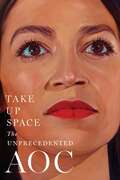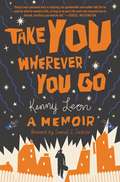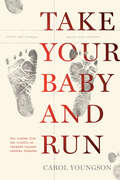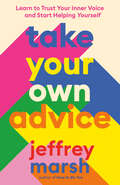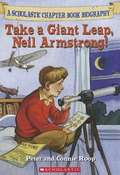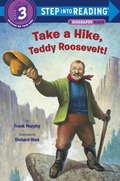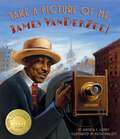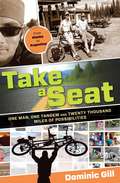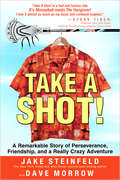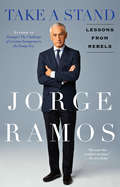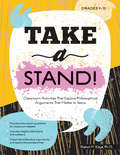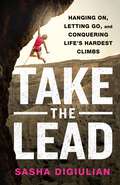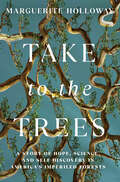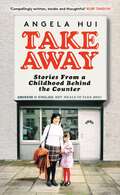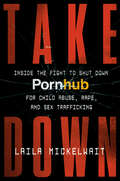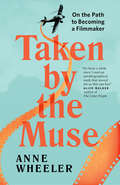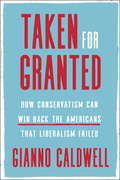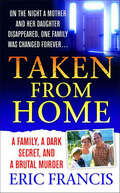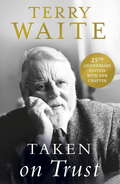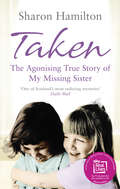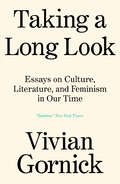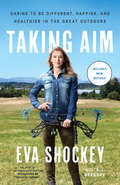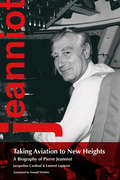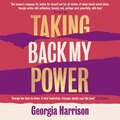- Table View
- List View
Take Up Space: The Unprecedented AOC
by The Editors of New York MagazineA stunning four-color biography of Congresswoman Alexandria Ocasio-Cortez in the bestselling tradition of Notorious RBG and Pelosi that explores her explosive rise and impact on the future of American culture and politics.The candidate was young—twenty-eight years old, a child of Puerto Rico, the Bronx, and Yorktown Heights. She was working as a waitress and bartender. She was completely unknown, and taking on a ten-term incumbent in a city famous for protecting its political institutions. &“Women like me aren&’t supposed to run for office,&” Alexandria Ocasio-Cortez said in a video launching her campaign, the camera following her as she hastily pulled her hair into a bun. But she did. And in perhaps the most stunning upset in recent memory, she won. At twenty-nine, she was sworn in as the youngest member of the 116th Congress and became the youngest woman to serve as a representative in United States history. Before long, Ocasio-Cortez had earned her own shorthand title—AOC—and was one of the most talked-about public figures (loved and loathed) in the world. Her natural ability to connect with everyday people through the social media feeds grew her following into the multimillions. Every statement she made, every tweet and Instagram Live, went viral, and her term had barely begun before people were speculating that she could one day be president. The question seemed to be on everyone&’s mind: How did this woman come from nowhere to acquire such influence, and so fast? Now, in Take Up Space, that question is answered through a kaleidoscopic biography by the editors of New York magazine that features the riveting account of her rise by Lisa Miller, an essay by Rebecca Traister that explains why she is an unprecedented figure in American politics, and multiform explorations (reportage, comic, history, analysis, photography) of AOC&’s outsize impact on American culture and politics. Throughout, AOC is revealed in all her power and vulnerability, and understood in the context of the fast-changing America that made her possible—and perhaps even inevitable.
Take You Wherever You Go
by Samuel L. Jackson Kenny Leon"You can do whatever you want to do. The only limits are the ones you set yourself. You have all you need in you right now."When Kenny Leon's grandmother told him to "take you wherever you go," she could hardly have anticipated that he would establish himself as one of Broadway's most exciting and acclaimed directors. But through years of hard work, Kenny would migrate from a small wooden house in rural Florida to the Tony Awards' stage, where he would win Best Direction of a Play for his 2014 revival of A Raisin in the Sun. In TAKE YOU WHEREVER YOU GO, Leon reflects on the pillars of wisdom he learned every step of the way from the most important people in his life-from his grandmother's sagacious and encouraging motivations to the steady hand of his mother to the deep artistic and social influence of iconic American playwright August Wilson. TAKE YOU WHEREVER YOU GO is a poignant, ruminative, and inspirational memoir that empowers you to be true to yourself as you navigate your own path.
Take Your Baby And Run: How nurses blew the whistle on Canada’s biggest cardiac disaster
by Carol YoungsonForeword by Lanette Siragusa, RN NM Take Your Baby and Run is Carol Youngson's first-hand account of the shocking ineptitude and misogynistic behaviour that led to the death of twelve children, primarily infants, under the care of Dr. Jonah Odim at Winnipeg's largest hospital in 1994. Youngson was the nurse in charge of the cardiac unit and in her book she details the dysfunctional hospital hierarchy that allowed this tragedy to unfold, leading to the longest running inquiry in Canadian history. Sadly, the themes of this book are just as relevant today during our current health crisis.
Take Your Own Advice: Learn to Trust Your Inner Voice and Start Helping Yourself
by Jeffrey MarshFor those who are givers, carers, and empaths, a guide to focusing that energy on yourself—even if that feels frightening, from popular LGBTQ+ activist and advocate Jeffrey Marsh. Like many of us, Jeffrey Marsh was conditioned to have an outward focus—to give to others, to be a good listener, and to be the one who gave the best advice. In Marsh&’s case, it was a method of survival. Growing up genderfluid in an unaccepting family, Marsh did everything they could to meet the needs of others and not have needs of their own. And ultimately, this meant Marsh put themself in the backseat of their own life. In this heartfelt and sincere book, Marsh shares their story and the lessons they learned on the path back to themselves. Whether you&’re a survivor of abuse and trauma like Marsh or you&’ve passively accepted that your worth ought to be defined by your usefulness to others, Take Your Own Advice will give you the confidence to lead your life on your terms, and to prioritize what&’s important: you. It&’s time that you learn to put yourself first, to take care of yourself, and to ask others to listen to you for a change. You do give the best advice, after all!
Take a Giant Leap, Neil Armstrong! (Before I Made History)
by Peter Roop Connie RoopScholastic Chapter Book, Biography of Neil Armstrong, the first man on the moon and what he was like as a young boy. <P><P>Lexile Measure: 720L
Take a Hike, Teddy Roosevelt! (Step into Reading)
by Frank Murphy illustrated by Richard WalzA Step 3 Step into Reading Biography Reader about Teddy Roosevelt and his efforts to protect our environment and establish national parks. Teddy battled asthma all his life, and the list of things he shouldn't do was long. But when people told him "you can't," he set about proving them wrong. This book focuses on his inexhaustible enthusiasm and his commitment to preserving America's natural resources. Step 3 Readers feature engaging characters in easy-to-follow plots about popular topics. For children who are ready to read on their own.
Take a Picture of Me, James Van Der Zee!
by Andrea J. LoneyNAACP Image Awards Nominee - National Association for the Advancement of Colored People (NAACP)A biography of James Van Der Zee, innovative and celebrated African American photographer of the Harlem Renaissance.James VanDerZee was just a young boy when he saved enough money to buy his first camera. He took photos of his family, classmates, and anyone who would sit still for a portrait. By the fifth grade, James was the school photographer and unofficial town photographer. Eventually he outgrew his small town and moved to the exciting, fast-paced world of New York City. After being told by his boss that no one would want his or her photo taken "by a black man," James opened his own portrait studio in Harlem. He took photographs of legendary figures of the Harlem Renaissance-politicians such as Marcus Garvey, performers including Florence Mills, Bill "Bojangles" Robinson, and Mamie Smith-and ordinary folks in the neighborhood too. Everyone wanted fancy portraits by James VanDerZee. Winner of Lee & Low's New Voices Award, Take a Picture of Me, James VanDerZee! tells the story of a groundbreaking artist who chronicled an important era in Harlem and showed the beauty and pride of its people.
Take a Seat: One Man, One Tandem and Twenty Thousand Miles of Possibilities
by Dominic GillA remarkable journey of sharing and self-discovery. When Dominic Gill set out from Prudhoe Bay, Alaska, by bicycle on June 16, 2006, it was to be no ordinary bike ride. His goal was to reach Ushuaia, the southernmost city in South America, nearly 20,000 miles away, and he was starting off with virtually no money in his pocket, barely enough food to last a week, and, worst of all, with thousands of miles between him and his friends and family. But Dominic had a plan: His bicycle, Achilles, was a tandem and the spare seat was his secret weapon. He would invite strangers to join him on his long journey-strangers he hoped would become friends and help him turn a terrifying prospect into the adventure of a lifetime. In Take a Seat,Dominic tells the story of his incredible journey. Over twenty-six months, he covered 18,449 miles down the west coast of the Americas, passed through fifteen countries, was looked after by countless strangers, crashed into a Mexican banana truck, was nearly attacked by a mob of Bolivian political demonstrators, cycled past active volcanoes, and didn't have a single haircut. All sorts of colorful characters took a seat on Achilles-from a meditating, pot-smoking French Canadian named Pierre to the dark-haired Joselyn from Chile. Eventually, he reached Ushuaia, freezing and exhausted and with another new friend behind him-the 270th person to take that seat. He had achieved his dream. * In summer 2010, Dominic and his tandem bike embarked on a trip across America and headed toward New York City with a group of elderly and disabled people. The core values of this new journey remain the same: To travel. To share. To inspire. Dominic filmed the entire journey. To learn more, go to domandernie.com.
Take a Shot!: A Remarkable Story Of Perseverance, Friendship, And A Really Crazy Adventure
by Jake Steinfeld Dave MorrowTake a Shot! is the incredible true story of how three unlikely partners—world-famous fitness icon Jake Steinfeld, former Princeton University lacrosse star Dave Morrow, and son of a TV preacher Tim Robertson—broke all the rules and beat all the odds to create Major League Lacrosse. This book will take you on a roller-coaster ride through the ups and downs of starting a business—and not just any business, but a professional sports league built around America’s oldest and most tradition-bound game. Today, Major League Lacrosse is entering its 12th season, and the sport has exploded into the fastest-growing game in the U.S. But it wasn’t always that way . . . not even close. For four crazy, chaotic years, from 1998 to 2001, Jake, Dave, and Tim faced enormous obstacles and endless challenges in their lonely battle to make their lacrosse dream come true. From the earliest inspiration—Jake’s chance reading of a magazine article that got the ball rolling—to the wild search for investors and owners, to the insane setbacks that nearly derailed the league time and time again, to the emotional and triumphant debut of Major League Lacrosse, Take a Shot! is an action-packed, thrill-a-minute adventure story. But this book is also about friendship under fire. It tells the tale of three men from vastly different worlds—Jake, the brash Hollywood icon and driving force behind Major League Lacrosse; Dave, a shy Ivy Leaguer from blue-collar Detroit and the ultimate fish out of water; and Tim, the son of TV evangelist Pat Robertson and a multimedia mogul—who teamed up to try the impossible: start a professional sports league from scratch at a time when other leagues were crashing and burning around them. When Jake recruited Dave to be his partner, neither had any idea what was in store for them, nor what it took to start something like this (after all, who does?). But they had something more important: a gut instinct that, from day one, they could always trust each other. And so, with only a handshake, they ignored all the naysayers who warned them that they were doomed to fail and together built Major League Lacrosse, weathering every crisis and shrugging off each disaster along the way. And in the process, their partnership evolved into an enduring friendship, as Jake helped Dave blossom into a big-time entrepreneur, and Dave—at a crucial moment with everything on the line—came out of his shell and justified Jake’s relentless faith in him.
Take a Stand
by Jorge Ramos"People ask if I am a journalist or an activist. The truth is that I am just a journalist who asks questions, but one who does in fact take a stand."--Jorge Ramos After 30 fascinating years uncovering the hard truth, Emmy Award-winning journalist Jorge Ramos opens up for the first time about life-altering lessons by sharing captivating never-before-told stories. Widely recognized for his unapologetic, no-holds-barred approach to interviewing global leaders, business titans, democratic policy makers and dictators who threaten to derail those principles, Ramos unearths their one common trait--they are all rebels. Rebels are different. At some point they decided to challenge the prevailing status quo. Sometimes they rebelled to change a regime, other times to prevent abuse or discrimination, but in all cases they strived to correct an injustice.In Take a Stand, Ramos looks back on groundbreaking interviews with rebels such as President Barack Obama, Supreme Court Justice Sonia Sotomayor, Spike Lee, Barbara Walters, Fidel Castro and more. Candid and at times controversial, Ramos draws invaluable awareness of issues that influence the mindset of the largest minority in the country and how they will undoubtedly shape not only Presidential elections but also the future of America.
Take a Stand!: Classroom Activities That Explore Philosophical Arguments That Matter to Teens
by Sharon KayeTake a Stand! (grades 9–12) helps teens develop critical thinking skills by examining debates on issues directly relevant to their lives (that you won't find in most classroom materials). Each chapter:Covers an important topic relating to electronics, sex, mental health, and relationships.Presents a question for debate, such as "Should kids choose their own religion?" and "Is it possible to love more than one person?"Shows how each issue might arise in an ordinary teen conversation.Presents and explores two or more opposed answers to philosophical debates.Encourages high school students to develop their own positions while learning to appreciate other perspectives.Throughout the book, the chapter contributors—all current or recent teens themselves—highlight key definitions, quote compelling sources, and diagram the central arguments. Each chapter includes discussion questions to guide arguments, as well as helpful sidebars and illustrations to increase comprehension. Perfect for inspiring classroom discussion of topics that matter to today's teens.
Take a Stand, Rosa Parks!
by Peter Roop Connie RoopRosa Parks is famous for refusing to give up her seat on a bus. Do you know that Rosa felt her best achievement was helping young people? Rosa Parks was born in 1913. Do you know that her grandparents were slaves when they were born? Rosa Parks loved to learn. Do you know that Rosa could read before she went to school? Rosa Parks went to a one-room school-house. Do you know that Rosa's school had no glass windows? Rosa Parks was a hard worker. Do you know that Rosa picked cotton when she was only six years old? Rosa Parks was good at making things with her hands. Do you know that Rosa often earned a living sewing clothes? Rosa Parks enjoyed school. Do you know that Rosa quit high school to take care of her beloved grandmother when she was sick? Rosa Parks didn't go to college. Do you know that she received many special college degrees for her civil rights work? Rosa Parks liked to save things and use them again. Do you know that her nieces and nephews called Rosa "The Recycling Queen"? Rosa Parks is famous for her courage as an adult. Do you know that Rosa was also very brave as a young person? The answers to these questions lie in who Rosa Parks was as a young person before she made history.
Take the Lead: Hanging On, Letting Go, and Conquering Life's Hardest Climbs
by Sasha DiGiulianWorld champion climber Sasha DiGiulian tells her story—from coming of age under the scrutiny of social media, navigating a male-dominated sport, and tackling her most heart-stopping climbs—and shares the power of perseverance and positivity.At age six, Sasha DiGiulian stepped into a climbing gym for the first time and was competing within a year. Decked out in all-pink gear and with her blonde hair tied into pigtails, Sasha knew from an early age what it was like to be a girl in a traditionally male-dominated sport, vowing to never sacrifice her femininity to fit in. With a fierce love for the climb and incredible natural talent, Sasha soon won her first National Sport Climbing Championship at only seventeen, and a year later took the title of World Champion.To her fans, it looked like Sasha was on top of the world. But under the accolades, she was just another young woman learning how to handle the intense scrutiny of social media and dealing with body dysmorphia, all while quietly facing a potentially career-ending injury. In a relatable and inspiring voice, Take the Lead reflects on the highs and lows of Sasha’s illustrious life and career for the first time, bringing readers on her remarkable journey from novice climber to Columbia University graduate, adventurer, environmentalist, and entrepreneur, and one of the most recognizable faces in climbing. For readers of Cheryl Strayed’s Wild and Megan Rapinoe’s One Life, Take the Lead ultimately emphasizes the power of perseverance, fearlessness and positivity in tackling some of the most daunting and fearsome climbs—on and off the wall.
Take to the Trees: A Story of Hope, Science, and Self-Discovery in America's Imperiled Forests
by Marguerite HollowayOne of Heatmap's Climate Books to Read in 2025 An empowering journey into the overstory with the arborists and forest experts safeguarding our iconic trees. Journalist Marguerite Holloway arrives at the Women’s Tree Climbing Workshop as a climbing novice, but with a passion for trees and a deep concern about their future. Run by twin sister tree doctors Bear LeVangie and Melissa LeVangie Ingersoll, the workshop helps people—from everyday tree lovers to women arborists working in a largely male industry—develop impressive technical skills and ascend into the canopy. As Holloway tackles unfamiliar equipment and dizzying heights, she learns about the science of trees and tells the stories of charismatic species, including hemlock, aspen, Atlantic white cedar, oak, and beech. She spotlights experts who are chronicling the great dying that is underway in forests around the world as trees face simultaneous and accelerating threats from drought, heat, floods, disease, and other disruptions. As she climbs, Holloway also comes to understand the profound significance of trees in her relationship with her late mother and brother. The book’s rousing final chapter offers something new: a grander environmental and arboreal optimism, in which the story of trees and their resilience meshes with that of people working to steward the forests of the future, and of community found among fellow tree climbers. A lyrical work of memoir and reportage, Take to the Trees sounds the alarm about rapid arboreal decline while also offering hope about how we might care for our forests and ourselves.
Takeaway: Stories from a childhood behind the counter
by Angela HuiAn eye-opening memoir revealing the stories behind living in and running a Chinese takeaway.Growing up in a Chinese takeaway in rural Wales, Angela Hui was made aware at a very young age of just how different she and her family were seen by her local community. From attacks on the shopfront (in other words, their home), to verbal abuse from customers, and confrontations that ended with her dad wielding the meat cleaver; life growing up in a takeaway was far from peaceful.But alongside the strife, there was also beauty and joy in the rhythm of life in the takeaway and in being surrounded by the food of her home culture. Family dinners before service, research trips to Hong Kong, preparing for the weekend rush with her brothers - the takeaway is a hive of activity before a customer even places their order of 'egg-fried rice and chop suey'.Bringing readers along on the journey from Angela's earliest memories in the takeaway to her family closing the shop after 30 years in business, this is a brilliantly warm and immersive memoir from someone on the other side of the counter.
Takedown: Inside the Fight to Shut Down Pornhub for Child Abuse, Rape, and Sex Trafficking
by Laila MickelwaitThe gripping, true story of one woman&’s battle to expose and shut down a criminal online porn empire.Pornhub was the 10th most visited site on the Internet, often praised as a progressive champion of women. Then one day, an activist discovered a secret they had been keeping from the world for over a decade: it was infested with child sexual abuse and rape videos.Now for the first time, anti-trafficking expert and mother of two Laila Mickelwait tells the story of her battle against Pornhub&’s billionaire executives and the credit card companies who helped them monetize the abuse of countless victims—some as young as three years old. Readers will follow her from her first horrifying discovery of criminal content on Pornhub to closed-door meetings with credit card executives, White House and Justice Department senior officials, a powerful hedge-fund manager and more. Through insider accounts from Pornhub moderators and executives, you&’ll meet the world&’s first online porn tycoon, AKA &“the Zuckerberg of porn,&” along with Pornhub&’s top brass (known internally as &“The Bro Club&”) who operate in secrecy.The culmination of years of activism, Takedown is the true, never before told story of how Mickelwait mobilized a movement of two million people and together they accomplished "the biggest takedown of content in Internet history." (Financial Times)
Taken by the Muse: On the Path to becoming a Filmmaker
by Anne WheelerFinalist for the Robert Kroetsch City of Edmonton Book Prize at the 2021 Alberta Literary Awards!Finalist for the High Plains Book Awards in the Nonfiction CategoryLaced with humour and revelation, Anne Wheeler’s creative non-fiction stories tell of her serendipitous journey in the seventies, when she broke with tradition and found her own way to becoming a filmmaker and raconteur.Join this celebrated screenwriter and director as she travels south of Mombasa after calling off her wedding; attempts to gain acceptance in a male-dominated film collective; travels to India to visit friends who are devoted to a radical Master, and ultimately discovers her sense of purpose and passion close to home, sharing stories that would otherwise be lost about ordinary people living extraordinary lives.Taken by the Muse: On the Path to Becoming a Filmmaker is a must-read for anyone open to exploring the possibilities of who they are and what they might do with their lives — and for those who love a good story told with integrity and warmth.
Taken for Granted: How Conservatism Can Win Back the Americans That Liberalism Failed
by Gianno CaldwellA Fox News political analyst tackles some of our communities&’ toughest challenges with timely insight from his own life: the story of how conservative values helped a kid from the South Side of Chicago find a life of opportunity.&“A must-read.&”—Brian Kilmeade, bestselling author of Sam Houston and the Alamo AvengersBorn to a mother consumed by drugs and raised by his grandmother in poverty on the South Side of Chicago, Gianno Caldwell saw firsthand how lawmakers from both parties have failed African American voters on issues like poverty, welfare, and education. But as someone who beat the odds growing up under a fear-based mentality that limits what people can achieve, Caldwell believes there&’s another way.In this groundbreaking book, the Fox News analyst describes his personal journey while detailing a hopeful vision for a nation no longer beholden to identity politics and self-limitations. Trapped within the expectations and traditions of our communities, families, political parties, faith, race, and gender, we fail to challenge our politicians and ourselves to create real change. Now more than ever, we need to confront preconceived notions about the Democrats and Republicans, public policy, and American history. Looking at the obstacles facing urban communities, such as crime, education, and social mobility, Caldwell digs beneath the statistics. By spotlighting the moments that enabled his rise to success, he proffers steps that can help more people overcome the odds—whether through policy reform or the heroic efforts of men and women who are already working to make a difference in their own communities.
Taken from Home: A Family, a Dark Secret, and a Brutal Murder
by Eric FrancisThe acclaimed true crime writer tears the mask off of the perfect father, who committed a grisly murder that Grand Junction, Colorado, will never forget.Grand Junction, Colorado, 2001: When Michael Blagg’s adoring wife, Jennifer, and his six year-old-daughter, Abby, disappeared from their home, Michael led the charge to find them, even going so far as to make a nationwide appeal on Good Morning America for information. But seven months later, investigators found Jennifer’s remains in a Mesa County landfill, and things took a darker turn . . .Jennifer had been shot in the head, investigators discovered, and Abby was nowhere to be found. While Michael, a respected prayer-group leader, played the part of grieving survivor, authorities became increasingly suspicious There was blood evidence in the back of the family’s van. Was Blagg a cold-blooded killer? A religious fanatic? This is the terrifying true story of what happened when Jennifer and Abby Blagg were . . .TAKEN FROM HOME
Taken on Trust
by Terry WaiteThis autobiography describes the hours before and after Terry Waite was taken hostage in January 1987 in Beirut. Waite analyzes his thoughts and feelings immediately prior to captivity - what was the nature of his role as envoy for the Archbishop of Canterbury? What was his relationship with the Americans and Colonel Oliver North? The book looks at Waite from his upbringing in Styal, Cheshire, until after his release in November 1991, when he had become one of the best-known figures of his time. It is an account of his years in solitary confinement and of the inner strengths which enabled him to survive.
Taken: The Agonising True Story of My Missing Sister
by Sharon Hamilton'God only knows what fate befell Vicky after, cold and alone at that bus stop, she accepted a lift home.' Abducted from a local bus stop, schoolgirl Vicky Hamilton vanished into thin air. Her disappearance left the country in shock and a family torn apart. Sharon - her sister and best friend - never stopped looking for her. Then, seventeen years later, the search came to an abrupt and tragic end.Taken is Sharon Hamilton's heartbreaking true story of what happens to a family when one of its most loved members disappears without a trace. It's about never giving up hope that one day they will come home, and that justice will be done.
Taking A Long Look: Essays on Culture, Literature and Feminism in Our Time
by Vivian GornickOne of our most vital and incisive writers on literature, feminism, and knowing one's selfFor nearly fifty years, Vivian Gornick's essays, written with her characteristic clarity of perception and vibrant prose, have explored feminism and writing, literature and culture, politics and personal experience. Drawing writing from the course of her career, Taking a Long Look illuminates one of the driving themes behind Gornick's work: that the painful process of understanding one's self is what binds us to the larger world.In these essays, Gornick explores the lives and literature of Alfred Kazin, Mary McCarthy, Diana Trilling, Philip Roth, Joan Didion, and Herman Melville; the cultural impact of Silent Spring and Uncle Tom's Cabin; and the characters you might only find in a New York barber shop or midtown bus terminal. Even more, Taking a Long Look brings back into print her incendiary essays, first published in the Village Voice, championing the emergence of the women's liberation movement of the 1970s.Alternately crackling with urgency or lucid with insight, the essays in Taking a Long Look demonstrate one of America's most beloved critics at her best.
Taking Aim: Daring to Be Different, Happier, and Healthier in the Great Outdoors
by A. J. Gregory Eva ShockeyAn acclaimed bow hunter who defies the stereotype that hunting is a man’s game, Eva Shockey is a TV and social media phenomenon at the forefront of a new wave of women and girls who are passionate about outdoor sports. Eva Shockey grew up expecting to be a dancer like her glamorous mother. But something about spending family vacations RV-ing across North America and going on hunts with her dad sparked in her an enduring passion for a different way of life. In Taking Aim, Eva tells a very personal story of choosing the less-traveled path to a rewarding life in outdoor pursuits like hunting and fishing. For her, as her millions of fans can attest, that has meant hunting as a way of harvesting food, caring deeply about conservation, sustainability and healthy eating, and getting closer to God in nature. In this riveting memoir for the adventurer in all of us, Eva takes readers along as she hunts caribou on the rugged Aleutian Islands, tracks a 1,500-pound bull moose across the unforgiving Yukon, and meets many other challenges of a life in the wild. Along the way we learn that hunting is about so much more than pulling a trigger. "My story is about discovering your dream," writes Eva. "It's about following your passion, mastering your skills, taking aim no matter who thinks you’re crazy…and then letting the arrow fly. If you’ve done all you can, I can tell you that you’re almost certain to hit your mark." Whether you’re a lifelong hunter or a city dweller who has never set foot in the wilderness, Eva’s story delivers an empowering message about rejecting stereotypes and expectations, believing in yourself, and finding the courage to pursue what you care about most.
Taking Aviation to New Heights: A Biography of Pierre Jeanniot
by Jacqueline Cardinal Laurent LapierreTo chart the inspiring journey of Pierre Jeanniot is to trace the remarkable development of the air transport industry. In his youth, Jeanniot survived the bombing of Rome, the occupation of France, and was a witness to the Resistance in the Jura Mountains. In 1963, after the Sainte-Thérèse air tragedy and the threat of finding himself jobless, Jeanniot was inspired to create the famous Black Box, which has since become a pillar of aviation security. Under his direction, Air Canada chose the Airbus rather than the Boeing to renew its fleet, in the midst of a highly visible political crisis. Against all odds, Jeanniot also orchestrated the successful privatization of the airline. His visionary speech at Amman, delivered when he was at the helm of the International Air Transport Association (IATA), laid out modern aviation’s most urgent priorities regarding accident prevention, protection of the environment, and technological progress. A master of logistics, he successfully negotiated the impasse in the skies following the September 11 terrorist attacks and handled the many complications that came in their wake. Pierre Jeanniot’s influence has been felt far beyond the aviation world. His longstanding desire to facilitate access to higher learning led him to participate actively in the founding of the Université du Québec. A skilled diplomat, he also helped to resolve political problems in Iran, Libya, North Korea, and the Middle East. Taking Aviation to New Heights is the story of a great leader who has left an indelible mark on his milieu. He has truly piloted aviation to new heights. - This book is published in English
Taking Back My Power: Our Bodies. Our Consent.
by Georgia HarrisonTaking Back My Power is a must-listen for anyone who cares about women's rights and the ongoing struggle for justice and equality in the digital age. Just as much a manifesto as it is a memoir, this inspiring and important audiobook will be a whole movement, sparking much-needed change.A ground-breaking, eye-opening and inspiring memoir-meets-manifesto by Georgia Harrison, who rocketed to fame after winning a court case against her ex-boyfriend on counts of revenge porn. This audiobook will be a movement.In 2020, Georgia Harrison's world was ripped apart when her ex-boyfriend Stephen Bear shared intimate footage of her online without consent. But this is not a sad story - it's a story about the power of hope, a journey to justice, and a rallying cry for change.Thanks to Georgia's trailblazing and courageous campaign, Bear was found guilty of revenge porn, voyeurism, and two counts of disclosing private sexual photographs and films with intent to cause distress. This culminated in a 21-month jail sentence, a ruling that has been widely celebrated as a huge win for women - and which has cemented Georgia as a feminist icon.In the unfiltered and unflinching Taking Back My Power, Georgia tells her empowering story. This important and inspirational audiobook calls attention to the urgent need to address the issue of non-consensual filming that affects so many young girls and women today. Holding nothing back, Georgia shines a light on how to navigate traumatic times - the importance of hope, building resilience and a positive mindset. Taking Back My Power is more than just a memoir; it's an entire movement.(P)2023 Little Brown Book Group Limited for and on behalf of Dialogue Books
